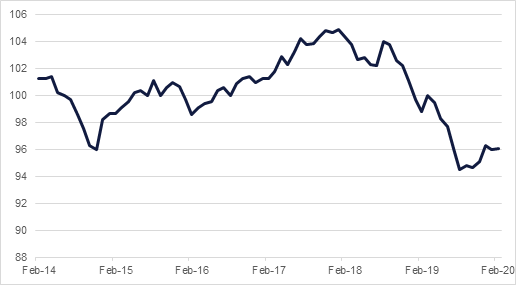
Markets were battered yesterday as fears around the Covid-19 outbreak heightened, with equity market sell-offs around the world. The rapid rise in cases in countries other than China, with Italy and South Korea in particular dominating headlines, has raised concerns over the longevity of its impact on the global economy, and with more markets around the globe directly affected, the chances of a rapid v-shaped recovery will be harder to come by. The number of cases around the world has now risen to over 80,000, although the WHO has resisted calls by other bodies to label the outbreak a pandemic. The IMF has downgraded its China growth forecast from 6.0% to 5.6%, and there is mounting speculation over a potential cut to the benchmark deposit rate by the PBOC.
Germany’s IFO business climate survey reported a modest improvement in February, ticking up from (an upwardly revised) 96.0 in January to 96.1 – exceeding expectations of 95.3. While the current assessment deteriorated from 99.2 to 98.9, expectations climbed from 92.9 to 93.4. The survey managed to hold up comparatively well despite the mounting pressure from the Covid-19 threat, but the index nevertheless remains soft by historical standards and the outlook for German growth in the first quarter is weak.
In the US, there were mixed survey results. The Chicago Fed national activity index came in below estimates, at -0.25 compared to -0.18, indicating below-trend growth in the economy. Meanwhile, the Dallas Fed manufacturing outlook survey indicated an improvement in factories, as it turned positive for the first time in five months at 1.2. This is in keeping with other recent data points such as the New York Fed’s manufacturing survey hitting a nine-month high this month, but it could prove to be the calm before the storm with regards to the impact of the Coronavirus.
France has joined other long-term Lebanon supporter Saudi Arabia in saying that it is prepared to help the embattled country through its current crisis, although both will likely look to see some real progress and commitments to ongoing economic rebalancing. The economic meltdown in Lebanon, exacerbated by a political crisis since October, has made a restructuring of some of its debt almost certain, and both S&P and Moody’s made downgrades over the weekend.
 Source: Bloomberg, Emirates NBD Research
Source: Bloomberg, Emirates NBD Research
Treasuries closed sharply higher tracking a broad risk-off mood in financial markets. While it was a continuation of trend we have seen in USTs since the outbreak, the quantum of move was surprising. Yields on the 2y UST and 10y UST closed at 1.24% (-11 bps) and 1.37% (-10 bps) respectively. The 10y USTs has closed below 1.4% level for the first time since June 2016.
Regional bonds continue to benefit from moves in benchmark yields. The YTW on Bloomberg Barclays GCC Credit and High Yield index dropped -3 bps to 2.84% while credit spreads widened 6 bps to 149 bps.
This morning USDJPY has found bids near its four-day lows and increased by 0.10% to the current price of 110.82. A daily close above 111.20 would be required for USDJPY to hold onto these gains and retest the 112 level. Failing to do this could see a retest of the 110.35 level, a break of which would trigger more significant declines. Fundamentally, the direction of USDJPY is likely to continue to be guided by risk appetite which in turn will be determined by updates on the spread of the coronavirus and continued volatility can be expected.
The Turkish lira has fallen to TRY 6.11/USD, levels last seen in May last year. The currency is being battered by general global risk-off sentiment, combined with domestic concerns over Covid-19 cases in neighbouring Iran, and geopolitical tensions in Syria. By contrast, the EGP continues to make gains, strengthening to EGP 15.53/USD.
Global equity markets closed sharply lower as investors became wary of the impact of coronavirus following its rapid spread outside of China. Most indices wiped out their year to date gains as they recorded one of their largest single day losses. Effectively global markets saw a 3+ standard deviation move.
The S&P 500 index and the Euro Stoxx 600 index dropped -3.4% and -3.8% respectively. Regional markets were no different with the Tadawul and Qatar Exchange losing -3.0% and -1.3% respectively.
There had been some muted optimism in oil prices over the past couple of weeks as there were hopes that the coronavirus would be contained, and that positive news out of OPEC with regards extending production cuts would help keep the market in balance. However, this optimism waned yesterday as the number of global cases rose. While Brent crude didn’t quite dip to the sub-54 dollars a barrel levels we saw earlier in the month, it did lose 3.8% compared to Friday’s close, to USD 56.3/b. WTI fell 3.7% to USD 51.4/b. Both benchmarks are trading moderately stronger this morning, but not sufficient to recoup yesterday’s losses.